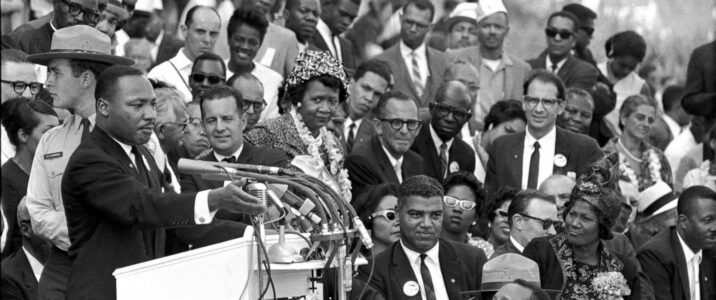Virtually every elementary school student in America is aware of Dr. Martin Luther King Jr. His delivery of the iconic “I Have a Dream” speech from the steps of the Lincoln Memorial on August 28, 1963, cemented his legacy as one of the most highly revered figures of the Civil Rights Movement. Pictures of the wisdom exuding through his coolly reserved visage lend him a regal, almost deified persona. His powerful cadence and eloquent diction can be heard in countless YouTube videos, and his array of accomplishments, including receiving a Nobel Peace Prize and having Congress pass the Civil Rights Act, rank among the greatest feats in American lore.
But what is discussed less often in schools is the institutional opposition Dr. King faced during his lifetime. Just two days after he delivered his seminal speech, the FBI issued a memo labeling Dr. King as “the most dangerous negro in America.” Because of his close ties to Stanley David Levison, a Jewish attorney and formerly branded communist, J. Edgar Hoover and his team feared that Dr. King’s influence would result in a major communist takeover and attempted to undermine him by any means necessary. Their subsequent efforts comprise the content of the documentary MLK/FBI.
Many of the tactics the FBI employed to deter Dr. King, from tapping his phones to delivering false audio tapes of his extramarital affairs to his wife, Coretta Scott, are not necessarily revelatory news. Ava DuVernay’s Selma (2014) made a point of emphasizing the latter as a source of conflict between Martin and Coretta. But director Sam Pollard keeps the material gripping thanks to his discernment regarding Hoover’s influence on public information, and its connection to the racially charged attacks Dr. King faced daily until his 1968 assassination.

MLK/FBI portrays Hoover as a formidable autocrat whose persona was crafted to symbolize the face of law and order through media material like The FBI Story and propaganda films (samples from one of these films shows a wide-eyed little boy praising Hoover and his agents for their diligence in the line of duty). These aided him in his efforts to silence and suppress left-wing movements advocating for racial and economic equality during the 50s and 60s. However, Pollard wisely refuses to depict J. Edgar, despite his power and influence, as the root of American racism. Instead, the film’s vast assortment of interviews with historians, FBI members, and associates of Dr. King present Hoover as a byproduct of a racist ideology that was prevalent long before he became director of the FBI.
Pollard argues that J. Edgar’s upbringing in a Southern, racially segregated neighborhood may have influenced his views on African Americans as being more susceptible to foreign powers, as well as guiding his desire to recruit masculine, white college football champions with Aryan features. His outrage at Dr. King’s sexual promiscuity is paralleled with America’s portrayal of the archetypal black male as a sexual deviant and trickster, most notably in major features such as D.W. Griffith’s infamous Birth of a Nation, which Pollard explicitly references.

The racial antagonism displayed here is but one of several iterations featured throughout the documentary. Another example is when Dr. King opposes the Vietnam War, Pollard reminding us just how severe a backlash he received from the general public. At that point, a public opinion poll showed a 50% favorability for Hoover as opposed to a mere 15-20% for Dr. King. Footage of protestors criticizing Dr. King, holding signs emblazoned with derogatory terms such as “Martin ‘Lucifer’ King” or “The Red Hitler,” offer a grim reminder of the extremely vitriolic behavior inflicted on Dr. King that is grossly absent in history lessons. Sequences like this recall recent news coverage of politicians branding members of organizations like Black Lives Matter as “thugs” and “rioters,” despite their transparent agenda for racial justice against police brutality. But MLK/FBI’s greatest strength lies in its refusal to openly allude to current events, opting to let the audience make their own connections.
MLK/FBI might not reveal anything we do not already know about Hoover or Dr. King, but its urgency keeps the material engaging. Its timeliness provides an essential reflection on a predominantly white narrative in America, one which fails to acknowledge the racial issues still permeating the United States today. The film’s closing shot has Dr. King staring directly into the camera, as if peering into our souls. Maybe we can look through his eyes the next time we find a picture of him in a history book.
